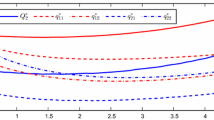Abstract
In this paper, we consider a supply chain network model that consists of three layers of decision-makers, namely, suppliers, manufacturers and retailers, with prices and shipments that evolve in time. We focus on the vertical integration of the levels of the supply chain and consider the retailer as the dominant player of the coalition. We give a novel reformulation of the evolutionary variational inequality related to the equilibrium conditions underlying the model. This approach, based on complementarity conditions, allows us to analyze the Lagrange multipliers associated with production capacities to understand better market’s trend. We study the behavior of marginal profits and provide some results for the efficiency and the stability of the coalitions. We apply our theoretical achievements to a duopolistic model.

Similar content being viewed by others
References
Amoozad Mahdiraji H, Govindan K, Zavadskas EK, Razavi Hajiagha SH (2014) Coalition or decentralization: a game-theoretic analysis of a three-echelon supply chain network. J Business Econ Manag 15(3):460–485
Barbagallo A, Daniele P, Giuffrè S, Maugeri A (2014) Variational approach for a general financial equilibrium problem: the deficit formula, the balance law and the liability formula a path to the economy recovery. Eur J Oper Res 237 (1):231–244
Daniele P, Maugeri A, Nagurney A (2017) Cybersecurity investments with nonlinear budget constraints: analysis of the marginal expected utilities. In: Daras N, Rassias T (eds) Operations research, engineering, and cyber security. Springer optimization and its applications, vol 113. Springer, Cham
Daniele P, Giuffrè S, Lorino M (2016) Functional inequalities, regularity and computation of the deficit and surplus variables in the financial equilibrium problem. J Global Optimization 65(3):575–596
Daniele P, Giuffrè S, Idone G, Maugeri A (2007) Infinite dimensional duality and applications. Math Ann 339:221–239
Ding D, Chen J (2008) Coordinating a three level supply chain with flexible return policies. Omega 36(5):865–876
Giuffrè S, Maugeri A, Puglisi D (2015) Lagrange multipliers in elastic-plastic torsion problem for nonlinear monotone operators. J Diff Equation 259(3):817–837
He Y, Zhao X (2012) Coordination in multi-echelon supply chain under supply and demand uncertainty. Int J Production Economics 139(1):106–115
Jahn J (1996) Introduction to the theory of nonlinear optimization. Springer, Berlin
Lin CC, Hsieh CC (2012) A cooperative coalitional game in duopolistic Supply-Chain competition. Netw Spat Econ 12(1):129–146
Maugeri A (1987) Convex programming,variational inequalities and applications to the traffic equilibrium problem. Appl Math Optim 16:169–185
Maugeri A, Raciti F (2010) Remarks on infinite dimensional duality. J Global Optim 46(4):581–588
Maugeri A, Raciti F (2009) On existence theorems for monotone and nonmonotone variational inequalities. J Convex Anal 16(3-4):899–911
Mirabella C, Scrimali L (2018) Cooperation in pollution control problems via evolutionary variational inequalities. J Global Optim 70:455–476
Oggioni G, Smeers Y, Allevi Em Schaible S (2012) A generalized nash equilibrium model of market coupling in the european power system. Netw Spat Econ 12(4):503–560
Scrimali L (2012) Infinite-dimensional duality theory applied to the study of investment strategies in Kyoto Protocol. J Optim Theory Appl 154:258–277
Scrimali L (2018) Coalitional games in evolutionary supply chain networks. In: Daniele P, Scrimali L (eds) Optimization and decision science: new trends in emerging complex real life problems, Springer
Shahabi M, Akbarinasaji S, Unnikrishnan A, James R (2013) Integrated inventory control and facility location decisions in a Multi-Echelon supply chain network with hubs. Netw Spat Econ 13(4):497–514
Acknowledgements
The research was partially supported by the research project “Modelli Matematici nell’Insegnamento-Apprendimento della Matematica” DMI, University of Catania. This support is gratefully acknowledged.
Author information
Authors and Affiliations
Corresponding author
Additional information
Publisher’s Note
Springer Nature remains neutral with regard to jurisdictional claims in published maps and institutional affiliations.
Rights and permissions
About this article
Cite this article
Scrimali, L. On the Stability of Coalitions in Supply Chain Networks via Generalized Complementarity Conditions. Netw Spat Econ 22, 379–394 (2022). https://doi.org/10.1007/s11067-019-09461-w
Published:
Issue Date:
DOI: https://doi.org/10.1007/s11067-019-09461-w




